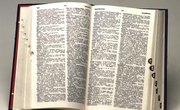Prepositions indicate time, condition, direction, location or duration. A prepositional phrase, typically three to five words, combines this indicative word with an object, a noun or pronoun, and may include modifiers. In the previous sentence, “with an object” is a prepositional phrase, using the preposition “with” and the article-noun combination “an object.” Such phrases cannot stand alone as sentences.
Phrases and Clauses
Groups of words that contain verbs are clauses, and those which can stand as sentences are called independent or main clauses. Phrases do not contain verbs, so they do not function as sentences. Leaving phrases on their own creates sentence fragments, a common grammar mistake.
Examples
This is an independent clause: “I found a good book in the local library.” It contains a subject (I) and verb (found) along with a direct object (book). A prepositional phrase indicates location: “in the local library.” Lacking a verb, this phrase is not a complete sentence.
Related Articles
References
Resources
Writer Bio
Jennifer Spirko has been writing professionally for more than 20 years, starting at "The Knoxville Journal." She has written for "MetroPulse," "Maryville-Alcoa Daily Times" and "Some" monthly. She has taught writing at North Carolina State University and the University of Tennessee. Spirko holds a Master of Arts from the Shakespeare Institute, Stratford-on-Avon, England.











